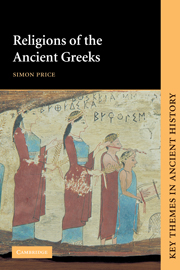Book contents
- Frontmatter
- Contents
- List of figures
- Preface
- List of abbreviations
- 1 Introduction
- 2 Gods, myths and festivals
- 3 Religious places
- 4 Authority, control and crisis
- 5 Girls and boys, women and men
- 6 Elective cults
- 7 Greek thinkers
- 8 Reactions to Greek religions
- Appendix of Greek inscriptions in translation
- Bibliographical essay
- Bibliography
- Index
2 - Gods, myths and festivals
Published online by Cambridge University Press: 05 June 2016
- Frontmatter
- Contents
- List of figures
- Preface
- List of abbreviations
- 1 Introduction
- 2 Gods, myths and festivals
- 3 Religious places
- 4 Authority, control and crisis
- 5 Girls and boys, women and men
- 6 Elective cults
- 7 Greek thinkers
- 8 Reactions to Greek religions
- Appendix of Greek inscriptions in translation
- Bibliographical essay
- Bibliography
- Index
Summary
According to a Christian writer of the second century, the Greeks had 365 gods. For the proponent of one (Christian) god this alleged fact demonstrated the absurdity of Greek religion. Moderns too sometimes assume the nobility and superiority of one supreme god (‘monotheism’) as against the proliferation of little gods (‘polytheism’). But the number of the Greek gods (not as great as 365) does not mean that those gods lack significance, any more than does the multiplicity of gods in the Hindu tradition. In addition, proponents of monotheism (whether Jewish, Christian or Islamic) are often not ready to note the disruptive consequences of monotheistic intolerance or the extent to which alleged monotheisms contain plural elements. Within Christianity, what about the Trinity, the Blessed Virgin Mary, or the Saints? In fact the categories ‘monotheism’ and ‘polytheism’ do not promote historical understanding. In both ethnography/anthropology and ancient history scholars have sometimes sought to ‘rescue’ polytheism by arguing for an element of monolatry or henotheism, in which the power of one god in the pantheon is proclaimed as supreme. But the manoeuvre is conditioned by a Judaeo-Christian evaluation of monotheism. The terms ‘polytheism’ and ‘monotheism’ are best abandoned to the theologians.
PANHELLENIG MYTHS
The principal Panhellenic Greek deities were quite limited in number, though infinitely extensible via epithets: Zeus, Hera, Athena, Apollo, Artemis, Poseidon, Aphrodite, Hermes, Hephaistos, Ares, Demeter, and Dionysos. These ‘twelve Olympians’, the number that became conventional in the fifth century BG, formed a family.
- Type
- Chapter
- Information
- Religions of the Ancient Greeks , pp. 11 - 46Publisher: Cambridge University PressPrint publication year: 1999

